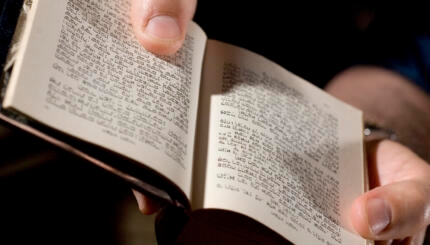Reprinted with permission of the author from On Being a Jew (The Johns Hopkins University Press). In this book of dialogues, an older traditionalist Jew, Albert Abbadi, explains Judaism to a young graduate student, Judd Lewis. Responding to a question about the importance of Hebrew, Abbadi first offers the observation that “Hebrew gives you access” to the synagogue service and Jewish classics “in a way that you would not otherwise have.” But beyond that, he argues, Hebrew also offers a “crucial advantage” because “a language is much more than a mere vehicle for thoughts. It shapes thoughts.” He continues:
AA: It is simply that, to put it as an apparent truism, Hebrew is the language in which Hebrew thoughts occur. To pray in Hebrew, to read the Torah in Hebrew, is to give to yourself the language in which certain thoughts and ideas are at home.
JL: And why is that so important?
AA: Because those thoughts and ideas are the fabric of Judaism. For Hebrew, as I said, is the language of the Torah and of our other writings, the language in which God has the names we spoke of (and not “Lord”), the language in which He speaks to Moses and other human beings, and in which He has mercy and forgives and remembers. That language constitutes a world, a sphere of action, and not a closed one: You too may enter it by learning the language and reading and remembering the texts. And then, with the language inside of you–well, it is just as with the mitzvot [commandments], the “doing” part of Judaism: It opens up a space inside.
So here, Hebrew too opens up a space inside you and allows these words to come back to you. Like the English thoughts that begin to intrude on the French native speaker, so Hebrew thoughts now have an opportunity to intrude on your own thinking and allow you to see what otherwise you might be blind to.
This is one reason, by the way, that Hebrew is called leshon ha-kodesh, “the holy language.” It is not that one language is intrinsically, by its origin or structure, holier than another. But Hebrew, by dint of being the language of Torah, ultimately became the location the world of a certain way of seeing.
With your help, My Jewish Learning can provide endless opportunities for learning, connection and discovery.
Torah
Pronunced: TORE-uh, Origin: Hebrew, the Five Books of Moses.


